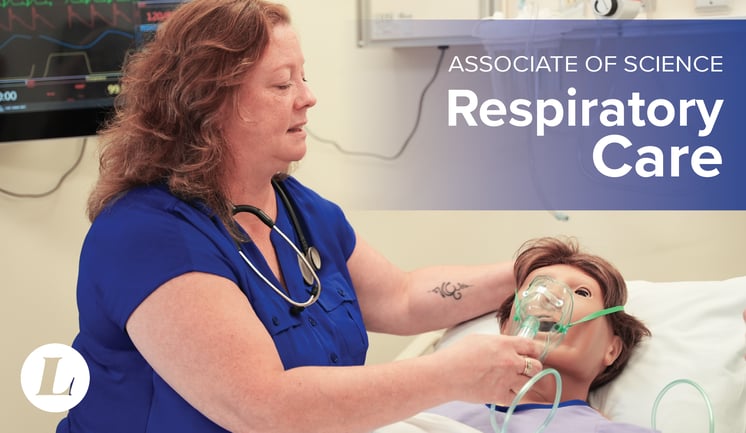How to Become a Respiratory Therapist
Becoming a respiratory therapist means you can help people live better lives. Learn more about what respiratory therapists do, why they are in demand, and the career opportunities that are available.
Are you driven to help others? Do you want a satisfying healthcare career that is both challenging and rewarding? Consider a career as a respiratory care professional, where you make a difference in many people’s lives.
So what is a respiratory therapist?
Respiratory therapists are healthcare professionals who help people who have breathing problems or lung disease. As front-line healthcare workers, respiratory therapists are in high demand and serve people of all ages.
Why do we need respiratory therapists?
Well, anything that impacts a person’s ability to breathe impacts their life and can lead to death. So we need trained professionals who are skilled in respiratory care to help people who have difficulty breathing.
Let’s look at some statistics on people in the U.S. who are affected by breathing problems.
Asthma, a respiratory disease that affects the lower airway, affects 8% of U.S. adults and 6.5% of U.S. children.
In 2020, chronic obstructive pulmonary disease, or COPD, sent over 1 million adults to the emergency room.
Respiratory distress syndrome, a lung disorder that mainly affects premature babies, sickens 1% of all infants.
Long-haul COVID symptoms often include lung problems.
Now that we've looked at why we need respiratory therapists, let's take a closer look at what respiratory care is, what respiratory therapists do, where they work, and how you can learn more about becoming a respiratory care professional.
Respiratory care is medical care that is focused on the respiratory, or breathing, system. Respiratory therapists are specially trained professionals who are equipped to provide respiratory care to people with lung and airway disorders.
A respiratory therapist's responsibilities will depend on where they work and who they provide care for. But there are some fundamental skills and practices that all respiratory therapists apply to provide the best care for their patients.
Lung disease and airway problems can have different causes, including illness, trauma, lifestyle choices, genetics, and environmental exposure. Because breathing problems can present at any time, in anyone, respiratory therapists work in many areas throughout the healthcare system.
Hospitals
Respiratory therapists can be found throughout hospitals, working with patients of all ages. Therapists may work in only one unit, or they may float to several areas depending on the needs of the patients.
Operating rooms, emergency rooms, and intensive care units all need respiratory therapists to manage and monitor patients’ breathing.
Some respiratory therapists only work with pediatric patients and may be found in pediatric intensive care units, newborn intensive care units, pediatric inpatient units, or specialized pediatric emergency rooms.
Respiratory therapists may also work as part of emergency transport teams, responding to accidents or calls for emergency medical treatment. This may involve flying in helicopters or planes or riding in ambulances.
Travel Jobs
Respiratory therapists with direct patient care experience may qualify for travel jobs. These positions are short-term assignments and allow professionals to experience other areas of the country, meet fellow travelers, and help hospitals that are short on respiratory therapists.
Outpatient Clinics
Respiratory therapists can work in pulmonary clinics, performing lung function tests to help doctors diagnose lung and airway disorders. They may help educate people about their lung disease and teach them to manage the condition at home.
Sleep clinics may hire respiratory therapists to help diagnose sleep disorders that affect the lungs and airways, such as sleep apnea.
Respiratory therapists may coach patients on making lifestyle changes to help them breathe better, perhaps as part of a smoking cessation program.
Home Health
A respiratory therapist may work as part of a home health care team. A home health respiratory therapist visits patients in their homes to provide education, troubleshoot problems with breathing or treatment machines, and assess patients to be sure they are getting the best care for their lungs.
Skilled Nursing Homes
Respiratory therapists provide respiratory care services for residents of skilled nursing homes and rehabilitation centers. Patients may be recovering from illnesses or injuries or have lung conditions that require oxygen or supportive breathing machines.
Respiratory care professionals also provide discharge education for patients and/or family members on how to use home breathing machines, give breathing treatments, and look for signs indicating they need to call their medical provider.
The minimum education requirement is a two-year associate degree from a respiratory care program, or equivalent course credits from a 4-year college.
After successfully completing a respiratory care program, a respiratory therapy candidate takes a national exam to become a certified respiratory therapist (CRT) and/or registered respiratory therapist (RRT).
If you want to learn more about how Labouré can help you become a respiratory therapist, click here.
A respiratory therapist may decide to advance their career by becoming certified in a specialty field. A specialist certification shows a commitment to providing optimal care to a specific patient population.
Specialist certifications available through the National Board for Respiratory Care (NBRC):
Advanced Practice Respiratory Therapist
The advanced practice respiratory therapist (APRT) is an emerging licensed role rooted in a lack of U.S. doctors who diagnose and treat heart and lung diseases, such as congestive heart failure, emphysema, and chronic obstructive pulmonary disease.
This highly specialized role is yet another option for respiratory therapists who want to expand their scope of practice. To obtain an APRT license, a registered respiratory therapist must complete a graduate program.
The U.S. Bureau of Labor Statistics shows an excellent job outlook for respiratory therapists through the end of the decade. The demand for respiratory therapists is expected to grow by 14% through the year 2031, almost triple the expected growth across all occupations (5%).
The median wage earned by respiratory therapists in 2021 was $61,830. Respiratory therapy salaries will vary depending on your level of education, where you work, and how much experience you have. Advancing your career with specialty certifications can help boost your income.
In a nutshell, a respiratory therapist is a vital healthcare team member who applies their knowledge and clinical skills to help the many people who have difficulty breathing.
As in-demand professionals, respiratory therapists enjoy an exciting career with many opportunities for job growth. But best of all, as a respiratory therapist, you’ll help people take life-sustaining breaths and make it easier for them to live their best life.
Ready to get started?

Becoming a respiratory therapist means you can help people live better lives. Learn more about what respiratory therapists do, why they are in demand, and the career opportunities that are available.

Respiratory therapists and nurses are both in high demand. Which career is right for you? Learn more about both professions in this article.

Labouré is excited to announce the launch of its Associate of Science in Respiratory Care! Students began their clinical classes in Fall 2023.
© 2024 Labouré College of Healthcare. All Rights Reserved.
Comments